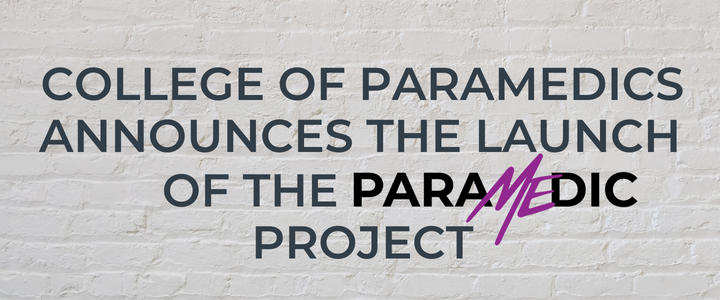The College of Paramedics is thrilled to announce the launch of the ‘ParaMEdic?’ project in partnership with The Prince’s Trust, St. John Ambulance, South Western Ambulance Service NHS Foundation Trust, NHS England and the University of the West England Bristol, which aims to deliver a three-day immersive ‘paramedic’ experience summer school for young people aged 16 to 25 from minoritised ethnic groups.
According to the latest figures, the paramedic profession does not currently reflect the diversity of the UK population, with only 3.4 per cent of paramedics being from a Black, Asian or Minority Ethnic background.
As such, this project aims to open up opportunities to young people from under-represented groups and disadvantaged backgrounds to consider and explore a career in Paramedicine. Longer-term, the goal is to increase diversity within the profession as a whole and forms part of a wider focus for the College of Paramedics and its commitment to change the lives of disadvantaged young people and reduce health inequalities within the communities they serve.
In order to achieve our aims, we have partnered with The Prince’s Trust and St. John Ambulance who will each recruit 25 young people from minoritised ethnic groups who may not have previously considered Paramedicine as a career choice. The 50 young people will then attend a three-day immersive ‘paramedic’ experience hosted by the University of West England Bristol and South Western Ambulance Service on August 8-10, 2023.
This experience will include high acuity simulation designed and delivered by final year student paramedics and newly qualified paramedics, as well as visits to an ambulance station, Emergency Operations Centre and Education Centre where they will learn basic life-saving skills and hear from paramedics working across the healthcare system, about their career journey.
Those taking part will experience a real taste of student life whilst staying in fully-funded campus accommodation. Entertainment in the evening will include a cinema night, music evening or sports activities. The event will conclude with a special celebration with celebrities and local and national press in attendance.
After the two-day event, the College of Paramedics will keep in regular contact with all the attendees, offering them further insight into the profession, tracking their progress, supporting them with applications and interview techniques and offering them assistance on how to join the profession when they are ready.
Following a successful pilot project, our aim is to continue to build on this event annually with the vision to provide this experience to a variety of young people from diverse backgrounds across the UK, partnering with different host universities. We envisage alumni from previous years becoming part of the event by sharing their experiences and inspiring the younger generations.
Overall, this project hopes to give young people from disadvantaged backgrounds the opportunity to thrive and contribute to our ever-growing profession so that they may provide effective, culturally-competent and diverse patient care within the community.
Kayhlan Norgrove, Youth Development Lead – Health and Social Care, from The Prince’s Trust said: “We are really excited to be working on this project and supporting more young people to gain awareness and understanding of working in the ambulance service, getting the opportunity to gain a valuable experience in partnership with the College of Paramedics.”
Paul Evans, Director of Youth and Education at St John Ambulance said: “St John Ambulance is delighted to be working in partnership with the College of Paramedics to showcase not only what a fulfilling and rewarding career Paramedicine offers, but importantly for that career to have representation from all members of society. We welcome the opportunity to be part of an event and movement designed to ensure greater representation from all communities and backgrounds in this most important of vocations.”
Tracy Nicholls, Chief Executive at the College of Paramedics said: “The College of Paramedics is delighted to support this innovative project and we look forward to enabling and encouraging these young people to find rewarding and fulfilling careers that they might not have originally considered. We recognise the importance in supporting improvements in the diversity of our profession and are committed to doing so. We also warmly welcome our partners in this project to fully maximise the potential for these young people.”
Paula Windsor, Assistant Director of Education Transformation at SWASFT said: “SWASFT are incredibly excited to be supporting the ParaMedic? project and the ambitions of the Prince’s Trust. It is vitally important that young people from disadvantaged backgrounds gain experiences to support success and achievement. As prospective employers, we must open up to enable such opportunities, and SWASFT is looking forward to providing valuable exposure to the world of a busy ambulance service and the role of a paramedic. SWASFT is committed to ensuring we play a significant part in being able to support the growth of a diverse workforce, which is reflective of the communities we serve.”
George Turner, Senior Paramedic Lecturer at the University of the West England said: “As a Paramedic Science team, we are really excited to be working alongside the College of Paramedics, Prince’s Trust and St John Ambulance to support young people in gaining more insight into this highly rewarding career. We’re honoured to support this project and with this, champion greater representation from all communities and backgrounds within the profession.”



